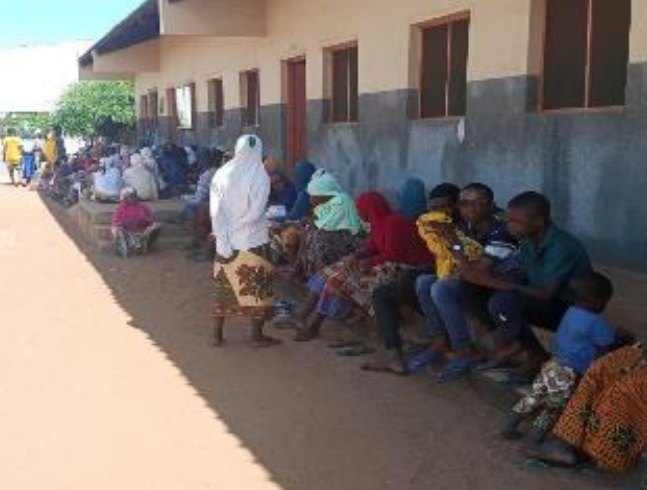Mozambique: Wounds, latent tension mark 50 years of independence - CC President
CIP Mozambique Elections: Inflating the register; Sofala problems continue

FILE - Throughout Sofala province there were still above average size crowds at registration post on , just three days from the end of the registration period which is June 3, Satruday . [Photo: CIP]
- Improper registration
- Gurue has registered 15,000 voters more than there are voting-age adults, but many people are still arriving at the posts
Although the target has been surpassed, voters are continuing to arrive, en masse, at the voter registration posts in Gurue. The average number of voters who register remains between 150 and 240 per day. But where do so many voters come from?
Our correspondents report that many of the voters registered came from neighbouring districts that have no municipalities. They were mostly workers of the public administration, and members of political parties, particularly Frelimo, mobilized for this purpose. They are voters who, during the first 30 days of the registration were prioritized by the supervisors. And it is suggested that some of this number come from clandestine registration, also of voters from neighbouring districts.
By 30 May, Gurue had registered 58,200 voters, which is 135% of the total of 43,000 voting age adults estimated to be in Gurue district by the National Statistics Institute. Even so, our correspondents in Gurue report that the number of potential voters making their way to the registration posts remains high. The daily average varies between 150 and 240 voters.
- 227 voters registered overnight by one brigade in Manjacaze, Gaza
A brigade member at the Madendere registration post, Chidenguele, Manjacaze, Gaza, reported his registration computer (“mobile ID”) was used to register 227 voters overnight. In order to make this possible, the brigade member says that Monday (29 May) he received a phone call from the Manjacaze district STAE director, instructing him to bring the weekly registration report from Madendere to be delivered to “chief Sitoe”, in Manjacaze. On his return, he was taken in a STAE vehicle, which is used to transport civic education agents, to Betula. They were told that the STAE district director was going to take them to Madendere.
“We went to Betula. We were told that chief Jonas (Mathe) would come to fetch us. We stayed a long time in Betula”, said the brigade member. They only dropped him off at his registration post in Madendere at 03.00 on the morning of Tuesday (30 May).
When he left for Manjacaze, he had registered 673 voters, and had not yet closed the registration book with 800 voters. To his surprise, when he returned and switched the machines on, he saw that there were 900 voters registered. That is, 227 clandestine voters were registered during his absence
“They had closed one book, and opened a new book which already had 100 voters registered. I protested. I called the brigade members and I asked what had been going on, because here we do not manage to register 20 people a day. And these extra 200 people we registered, where do they come from? I told my colleagues I wanted to know, because I didn’t want any problems”.
His colleagues told him they knew nothing about what had happened with the machines, and that he should contact the STAE district director for a better explanation. He says he contacted the district director, but the reply he received was a threat rather than an explanation.
The Renamo party monitor in that registration post says this was a scheme well prepared by the STAE district director and by the head of the Election Operations Department, named Sitoe.
Renamo monitors claim there is a massive registration of ghost voters, using photographs taken from Facebook, at a time when voters of Gaza are not registering.
Gaza has already registered 103% of the voting age adults in the districts with municipalities.
- Guard jailed for preventing illegal registration
The Gurue district court on Tuesday (30 May) sentenced Jaime Albino, a guard on the gate of Production Unit 4 in Gurue, to a year’s imprisonment and a fine of five times the minimum wage in the public administration (43,780 meticais, $700), to be paid within ten days, counted from 30 May. If he does not comply, he must serve a further six months in jail.
Albino prevented the entry of trucks carrying people from Ile and Namarroi districts in Zambezia, allegedly to register as voters at the registration post at UP4 in Gurue.
The case was brought by the Gurue STAE district director, Luis Martins, who claimed in court that Jaime Albino had attacked potential voters and prevented them from accessing the premises for registration.
- More than 10 voters caught attempting to register illicitly in Gorongosa
People were transported from the zone of regulo (chief) Canda, which is outside the municipality, by the First Secretary of the district Frelimo Party, accompanied by the secretary of the local Frelimo branch. They were registered Wednesday morning (31 May) in the Mpombwe EPC, in Gorongosa municipality. These people were discovered by the MDM and Renamo monitors inside the registration rooms (video). One of the vehicles that brought them supposedly belongs to the Mayor of Gorongosa.
- Frelimo accuses MDM of registering people from outside the municipality
The first secretary of Frelimo in Sofala, Luís Nhanzozo, has accused the MDM of using vehicles from the local municipality to transport people, supposedly collected in areas outside the city, in order for them to register in Beira.
- Blockages by STAE director cause overcrowding in Sofala posts
The blockages imposed by the STAE district director in Beira, Nelson Carlos de Rosário, earlier in the registration could mean that many citizens will be unable to vote this year. Throughout Sofala province there are still above average size crowds at registration posts, just three days from the end of the registration period. This contrasts with the South, particularly Gaza, where some brigades register fewer than 20 voters a day.
For example, in Macuti EPC in Beira, participation remains high and on average 100 voters a day are registered. Registration has been quick, with the brigade registering 12 voters in an hour, which means it take five minutes to register one voter.
Our correspondents report that the voter registration posts at the Amílcar Cabral Community School, the Pioneiros EPC, and the Vaz and Munhava Matope schools are full of people trying to register, as the photo below shows.
A brigade member at the registration post in the Muchatazina Secondary School, in Beira, was physically attacked by voters who accused him of favouring people in his confidence, while dozens of people had been waiting since early morning for places in the queue that would allow them access to a voter card. One of the attackers was detained in the 11th police precinct in Muchatazina.
On Wednesday (31 May) early morning in the Vaz EPC, voters almost came to blows because outsiders were being prioritised. The police intervened and avoided the worst. By midday, there were about 200 voters in the queue.
The same thing happened in the Ponta-Gea Secondary School and the Chipangara Primary School. There were a lot of people. The average rose to 115 voters registered a day.
Elsewhere in Sofala, in Caia district the same scenario was reported. In the Criança Nosso Futuro EPC, on the outskirts of Caia town an estimated 200 people were in the queue. In the Chirimba-2 EPC, also on the outskirts of Caia town, there were about 140 people in the queue.
Dondo is an exception. In the Munyonha EPC, in the Mafambisse administrative post, few voters turned up. There were less than 20 voters in the queue.
- Registration behind closed doors in Nampula city
Registration in the Nampaco EPC, in Nampula, took place behind closed doors up until 31 May, with the presence of two police agents inside the room. Our observers were not allowed to enter the room. The police threw them out, on the orders of the supervisors. The supervisors said they had received orders from the CNE and STAE that no observer should enter the registration post.
There were a large number of people inside the room waiting to register. Outside, members of the public accused the supervisors of demanding money as a condition for registration. The Namaco EPC is also not observing the rule of granting priority to pregnant women, elderly people and the disabled.
- Our correspondents see both crowds and no one
Manica: Some posts have large crowds, but others were practically deserted. For example, in Guro, at the three registration posts located in the Guro Basic School, the 12 October School, and the Cateté School, there were no voters. But in Chimoio in the posts at the Bambu Workyard, the 7 April Secondary School, and the post alongside that secondary school in the new Samora Machel neighbourhood, there were queues. .
Tete: There are reports of poor attendance at the posts in almost all the districts with municipalities. But in Angónia over 50 voters a day are being registered.
Nampula: There are still crowds almost everywhere, particularly the in the coastal municipalities which are strongholds of Renamo. For example, this Wednesday (31 May), at the Emopes EPC, in Angoche, there were enormous queues of voters. The post closed with many people still in the queues. On Tuesday, 185 voters were registered, and on Wednesday 110.
In Nampula city, cases are reported of the collection of documents supposedly to guarantee a place the following day. For example, in the 7 April EPC, this Wednesday (31 May), the identity cards of public administration employees were compulsorily collected, and their owners were told they had to come back the following day to register. In the ADEMO Community School, also in Nampula City, the supervisor took the place of the data input operator registering people, supposedly in his confidence, while many people were still waiting in the queue.
Registration remained slow in the registration post in the Serra da Mesa EPC, in the Huhala Expansão neighbourhood, even with two computers (“mobiles”), and there are signs that the brigade was prioritising outsiders.
In Nacala-Port, the registration posts at the 25 September, 1 June, Triangulo and Quissimajulo EPCs were full of voters. Each of these posts is registering, on average, 180 voters a day. Nacala-Port has just received a further 15 computers (“mobiles”) to boost the 26 mobiles operating in the city since the start of the registration. The STAE director in Nacala, Zacarias Amade, is optimistic about reaching the targets. So far, 120,810 voters have been registered, which is 65.9% of the target. Nacala envisages registering 183,141 potential voters by the end of the registration.
In Angoche, the registration post at the Inguri EPC continues to receive large numbers of voters. The average registered per day is 190.
Niassa: There is still a worrying situation in Cuamba, which currently has Renamo government and is a key Frelimo target. In the registration posts at the Mutxora EPC and the Cuamba Secondary School, for example, despite an extra registration computer (“mobile”) there are still large crowds. On Wednesday (31 May) there were more than 100 voters in the queues. In the secondary school, where there were also enormous queues, desks were made available where students, staff and other voters waited to be registered.
Maputo city & Matola: Attendance varies from zone to zone. It has fallen drastically in the “cement city” neighbourhoods. In Matola, where there are still crowds, new mobiles were allocated which are reducing the queues.
- Reports from our correspondents
The case of a 15 year old adolescent who registered in Hombwe neighbourhood, in Chimoio City, has been handed over to the judicial authorities National Elections Commission member António Focas Mauvilo told a press conference in Chimoio that it was not up to the members of the registration brigade to answer for the situation, since when the boy was presented by a witness who was said that he was 18 years of age, and thus old enough to register as a voter. The adolescent was discovered thanks to the intervention of the political party monitors.
Vilankulo, Inhambane, has registered more than the number of voting age adults established by the National Statistics Institute (INE). The estimate was of 26,300 adults, but, by 26 May, 27,000 had been registered within the municipal area. Yet few Vilankulo citzens are making their way to the registration posts. For example, in the post at the Massungue – Mungondze EPC, on average seven voters a day register.
A civic education agent was caught collecting voter cards. The Renamo provincial election agent in Inhambane city who surprised the person who was well identified and wearing the STAE/CNE uniform, entering the schoolyards and demanding voter cards, for unexplained purposes. Also in Inhambane, teachers at some schools have denounced the collection of voter cards in the city of Maxixe.
The new Ribáuè STAE director, Romana Magalhães, took office Tuesday (30 May). He replaces the former director who was dismissed because of his involvement in electoral crimes. Before his new post, Magalhães was director of the Cunle secondary school. The former STAE director is still at large.













Leave a Reply
Be the First to Comment!
You must be logged in to post a comment.
You must be logged in to post a comment.